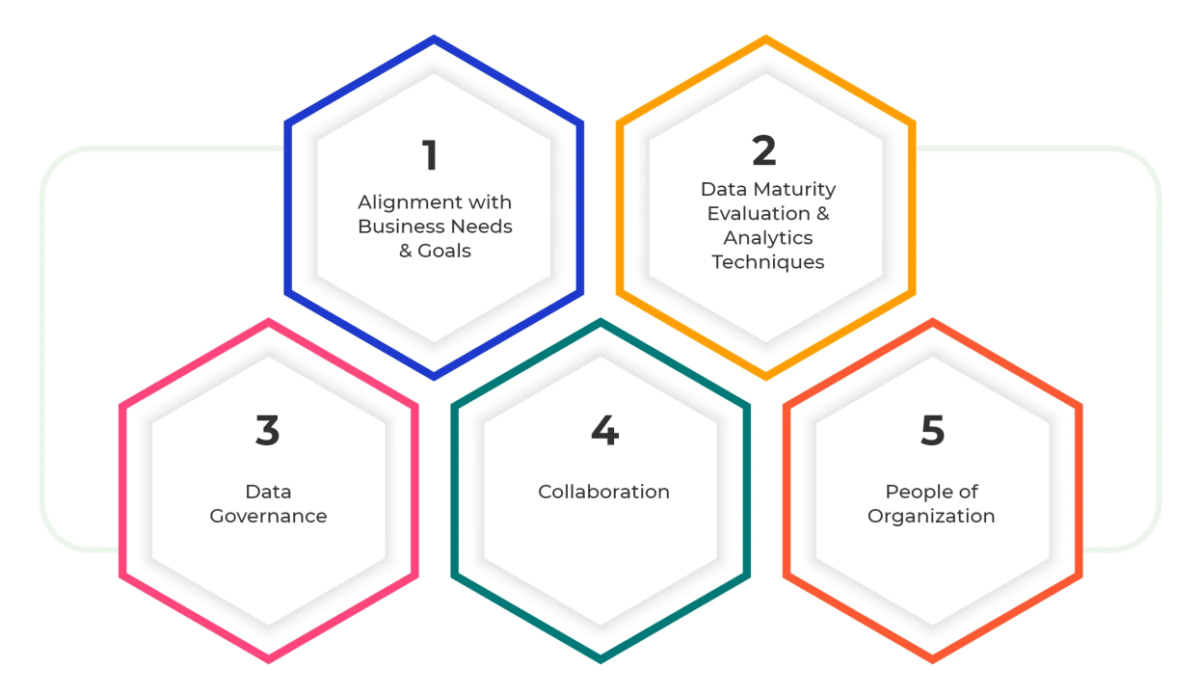Building a Successful Data Analytics Strategy: Key Considerations

In the current data-centric environment, businesses must leverage data analytics to maintain a competitive advantage. A well-structured data analytics strategy empowers organizations to make informed decisions, foster innovation, and improve customer experiences. However, crafting an effective strategy requires thoughtful planning and execution.
1. Recognizing the Significance of Data Analytics
Data analytics entails examining raw data to derive insights and guide decisions. For businesses, it is crucial for uncovering trends, enhancing operational efficiency, and boosting customer satisfaction. Organizations that effectively utilize data analytics gain a competitive edge, streamline processes, and cultivate a culture of data-driven decision-making.
2. Setting Clear Objectives
The initial step in crafting a successful data analytics strategy is to set clear objectives. Companies should pinpoint specific goals they aim to achieve through analytics, such as:
- Enhancing Customer Insights: Gaining a deeper understanding of customer behaviors and preferences to tailor offerings.
- Improving Operational Efficiency: Streamlining processes to cut costs and enhance productivity.
- Driving Revenue Growth: Identifying new market opportunities and refining pricing strategies.
- Strengthening Risk Management: Predicting potential risks and implementing strategies to mitigate them.
Well-defined objectives align analytics efforts with business goals and establish a framework for evaluating success.
3. Evaluating Current Data Capabilities
Before executing a data analytics strategy, organizations should assess their existing data capabilities. This involves reviewing the current data infrastructure, data quality, and the analytical skills within the team. Key questions to address include:
- What data sources are currently accessible? Identify both internal and external data sources, including customer databases, social media, and market research.
- Is the data accurate and reliable? Evaluate the quality of data regarding accuracy, completeness, and consistency.
- What analytical tools and technologies are currently in use? Review existing software, platforms, and systems that facilitate data analytics.
- Do employees possess the necessary skills? Assess the skill sets of team members to determine if additional training or recruitment is required.
Understanding current capabilities helps organizations identify gaps and areas for enhancement, paving the way for a robust analytics strategy.
4. Establishing a Data Governance Framework
An effective data governance framework is vital for maintaining data integrity, security, and compliance. Organizations should create clear policies and procedures for data management, including:
- Data Ownership: Designating individuals or teams responsible for data management.
- Data Quality Standards: Defining criteria for data accuracy, completeness, and consistency.
- Data Access Controls: Implementing security measures to safeguard sensitive information, ensuring that only authorized personnel can access data.
- Compliance Regulations: Adhering to relevant regulations, such as GDPR or CCPA, to protect customer privacy and data security.
A strong data governance framework fosters trust in data and promotes responsible data usage across the organization.
5. Selecting Appropriate Analytical Tools and Technologies
Choosing the right tools and technologies is critical for the successful execution of a data analytics strategy. Organizations should consider:
- Data Management Tools: Solutions for collecting, storing, and processing data, such as data warehouses or data lakes.
- Analytical Tools: Software for data analysis, including statistical tools (e.g., R, Python) and business intelligence platforms (e.g., Tableau, Power BI).
- Machine Learning and AI Solutions: Advanced tools that employ machine learning algorithms to identify patterns and make predictions.
- Collaboration and Visualization Tools: Platforms that facilitate team collaboration on data analysis and present findings in an engaging visual format.
Selecting the right tools ensures organizations can efficiently analyze data and derive actionable insights.
6. Developing a Competent Data Analytics Team
A successful data analytics strategy heavily relies on the expertise of the analytics team. Organizations should focus on:
- Hiring Skilled Professionals: Recruiting data analysts, data scientists, and data engineers with the right expertise and experience.
- Training Existing Staff: Providing training programs to enhance the analytical skills of current employees, including workshops, online courses, and certifications.
- Fostering a Data-Driven Culture: Encouraging a culture that values data-driven decision-making, empowering employees at all levels to use data in their roles.
A knowledgeable and motivated analytics team is essential for transforming data into actionable insights and driving organizational success.
7. Implementing a Data-Driven Decision-Making Process
To fully utilize data analytics, organizations must integrate data-driven decision-making into their operations. This involves:
- Establishing Data-Driven KPIs: Defining key performance indicators (KPIs) grounded in data analysis and aligned with business objectives.
- Promoting Collaboration: Encouraging cooperation between analytics teams and business units to ensure that insights are relevant and actionable.
- Adopting an Iterative Approach: Utilizing an agile method for decision-making, continuously evaluating and refining data insights based on new information.
By embedding data-driven decision-making into the organizational culture, companies enhance their responsiveness and adaptability in a rapidly changing business environment.
8. Prioritizing Data Security and Compliance
As organizations gather and analyze extensive data, prioritizing data security and compliance is essential. Key considerations include:
- Implementing Security Measures: Employing encryption, firewalls, and access controls to protect sensitive data from breaches and unauthorized access.
- Conducting Regular Audits and Assessments: Performing regular audits to evaluate data security practices and identify potential vulnerabilities.
- Staying Informed on Regulations: Keeping abreast of data protection regulations and ensuring compliance to avoid legal issues.
A strong commitment to data security and compliance not only protects the organization but also builds customer trust and confidence.
9. Measuring Success and Iterating
To evaluate the effectiveness of the data analytics strategy, organizations should establish a system for measuring success. This involves:
- Tracking Key Metrics: Monitoring KPIs related to analytics initiatives, such as return on investment (ROI), customer satisfaction scores, and improvements in operational efficiency.
- Gathering Feedback: Collecting feedback from stakeholders to understand the impact of data analytics on decision-making processes.
- Iterating and Improving: Utilizing insights from performance measurement to refine the analytics strategy and make necessary adjustments.
Continuous measurement and iteration ensure that the data analytics strategy remains aligned with organizational goals and adapts to changing business needs.
10. Encouraging Innovation Through Data Analytics
A successful data analytics strategy should not only focus on optimizing existing processes but also drive innovation within the organization. By leveraging data insights, organizations can:
- Identify New Opportunities: Discover emerging market trends, customer preferences, and potential growth areas.
- Encourage Experimentation: Use data to inform experiments and pilot projects that explore new ideas and approaches.
- Drive Product Development: Utilize customer feedback and data analysis to create products and services that meet evolving market demands.
By positioning data analytics as a catalyst for innovation, organizations can remain competitive and responsive to customer needs.
Conclusion
Creating a successful data analytics strategy requires careful consideration of various factors, from establishing clear objectives to building strong governance frameworks. By assessing current capabilities, selecting appropriate tools, developing a skilled team, and fostering a data-driven culture, organizations can unlock the full potential of their data. To support these efforts, investing in the best Data Analytics Training course in Delhi, Noida, Gurugram, Mumbai, Navi Mumbai, Thane, and other cities across India can equip teams with the necessary skills and knowledge to effectively analyze and interpret data.
As the business landscape continues to evolve, those who embrace data analytics will be better equipped to make informed decisions, foster innovation, and achieve sustainable success. Ultimately, a well-executed data analytics strategy not only enhances operational efficiency but also lays the groundwork for future growth and success in an increasingly data-oriented world.










